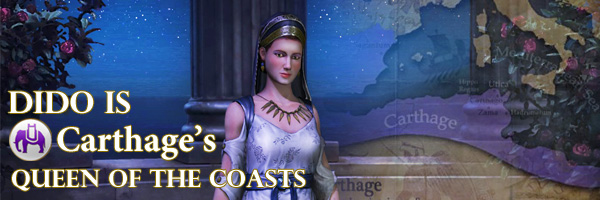
Continuing my series of strategy guides for the civilizations of Brave New World, I have now moved onto legacy civs whose strategies have changed somewhat due to the expansions' features. One civilization that received an indirect upgrade by the changes introduced in Brave New World is Dido's Carthaginian empire. Even though her actual ability didn't change, the new trade route mechanics changed the function of the harbor, which subtly changes how Carthage should be approached by Brave New World players.
In the ancient world, the Phoenicians exercised near absolute dominance over maritime trade in the south Mediterranean. Phoenician control was centered in Tyre, whose colonies paid tribute but were not directly controlled by Tyre itself. When Alexander the Great destroyed Tyre in 332 BC, the Phoenician colony of Carthage began claiming control over Tyre's former colonies in Sicily, Sardinia, Morocco, and Iberia, and established itself as the commercial center of the Western Mediterranean. This economic success and naval supremacy lead to three Sicilian Wars with Greece and three Punic Wars with the Roman Republic. The third Punic War resulted in the sacking and conquest of Carthage by the Romans.
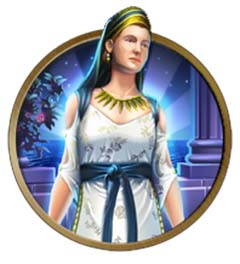
Historical records of Dido are very limited, and historians debate her historicity. The sources available indicate that she was the daughter of an unnamed King of Tyre, who named both her and her child brother, Pygmalion, as heirs. But when the king died, the people refused to acknowledge Dido as heir, and only Pygmalion was recognized. Pygmalion had Dido's husband, Acerbas murdered in order to claim Acerbas' vast wealth, and Dido stole away Acerbas' gold and fled Tyre along with some attendants and senators. She landed in North Africa, where a local Berber king granted her an amount of land that she could encompass with a single oxhide. So Dido cut the oxhide into small strips and encircled an entire nearby hill upon which the city of Byrsa was founded. She would later also found the city of Carthage before sacrificing herself in a pyre in order to remain faithful to her deceased husband and escape a marriage proposal from the Berber King. She would later be deified by the Carthaginian people, making it difficult to determine if the stories are genuine or just legend. [More]
74f48afc-17c0-43fc-a94b-e6ee198c32ae|6|4.0
Tags:Sid Meier's Civilization, Civilization V: Gods & Kings, Civilization V: Brave New World, Civilization V, Carthage, Dido, Phoenician Heritage, Quinquereme, African Forest Elephant, trireme, horseman, Feared Elephant, mountains, harbor, cargo ship, trade route, navy, Great General, Civ-V
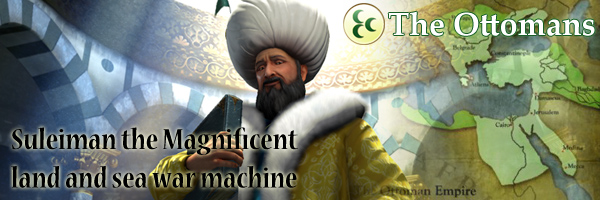
I've already covered strategies for the civilizations that have been added or explicitly changed in the Brave New World expansion and its major fall (2013) patch. Now I'm going to move on to other legacy civilizations that have not had explicit changes, but who may have had their strategies significantly altered by the expansions and other updates. The first such civilization that I am going to tackle is one that has been requested from readers on at least several occasions. So, by popular request, here is a strategy for Sultan Suleiman's Ottoman Empire.
The rise of the Ottoman empire coincided with the fall of the Byzantine empire that started in the late thirteenth century. Turkish immigrants lead by Osman I took control of a region of Anatolia and Osman declared himself the first Sultan of a new Islamic empire. The fledgling empire quickly began a cycle of conflicts with the Byzantine empire that culminated in the capture of Constantinople, which the Ottomans renamed Istanbul and made their imperial capital. With control of the valuable ports of Istanbul that linked the Mediterranean with the Black Sea, the Ottoman empire rapidly became a dominant force in the Middle East and Europe.
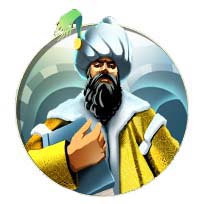
Sultan Suleiman The Magnificent ruled the Ottoman empire during the height of its power in the sixteenth century. His fleets dominated the seas of the Mediterranean - and extended its influence all the way to India and Indonesia - thanks in part to the successes of Hayreddin Barbarossa, who captured numerous ships on his way to becoming the Ottoman fleet admiral. In addition to military successes, Suleiman also personally initiated a series of sweeping social and legal reforms that contributed to the flourishing of the Ottoman arts and economy.
The Ottoman Empire would eventually become one of the most significant casualties of World War I. The empire was already starting to succumb to the stresses of internal strife and a weakening economy. Their defeat in World War I basically dissolved the Ottoman empire, and what was left of its holdings became the modern nation of Turkey. [More]
e1b70122-9c10-4a58-b569-98239be273c5|5|3.6
Tags:Sid Meier's Civilization, Civilization V: Brave New World, Civilization V, Ottoman, Suleiman, Istanbul, Janissary, Sipahi, Barbary Corsairs, barbados, navy, exploration, reconnaissance, musketman, lancer, Landsknecht, Prize Ships, unit cap, unit maintenance, Civ V Fall Patch, Civ-V
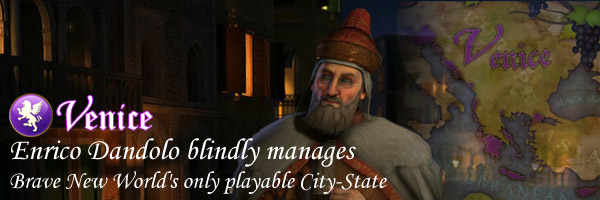
The penultimate entry in my series of strategy posts about Brave New World's new civilizations will focus on the very unique civilization of Venice: the playable City-State.
The city of Venice is one of the most architecturally astounding cities in the world. It is built on top of 118 small islands in the marshy Venetian lagoon. These natural and artificial islands are separated by a network of canals that run through the city and act almost like a network of roads. Many of the buildings and paved surface roads and walkways are built on top of stilts that emerge from these shallow canals and the city contains over 400 bridges. Historically, most of Venice's traffic has been through the waterways (via gondole) or on foot, but the modern city does have a contemporary road network (although a very compact one) intended for automobiles. Due to its unique environment and construction, the city is an astounding work of engineering art in and of itself.
There are no surviving historical records depicting the founding of Venice, but historians believe that the islands were originally settled by refugees from Roman cities during the Germanic and Hunnic invasions between 400 and 600 C.E. Venice began to expand its international influence prior to the thirteenth century by battling pirates that were plaguing trade in the Adriatic and Mediterranean. The city-state began to become an influential economic force in the region due to its position as a hub for trade between Europe and the Middle East, and Venice non-violently acquired control over many islands of the Aegean, including Cyprus and Crete. Failed military actions and the devastation of the black plague in the fifteenth century lead to the decline of the Venetian empire, and Venice was eventually conquered by Napoleon, then surrendered to Austria in the terms of a peace treaty, then conquered again by Italy during its war of independence. Fortunately, Venice was spared from attack during World War II, and so much of its historical architecture has remained intact, making it a popular tourist destination today.
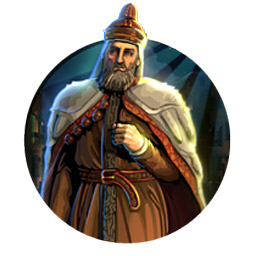
The 42nd Doge of Venice, Enrico Dandolo is known mostly for his blindness. There are conflicting stories regarding how Dandolo became blind. The decreasing legibility of his signature between 1174 and 1176 implies that he became blind gradually, possibly due to an injury sustained in Constantinople. He was also a very pious leader who provided invaluable assistance to the knights of the Fourth Crusade and played an integral part in the eventual sacking of Constantinople. Despite his blindness, Dandolo survived into extreme old age, being almost a hundred years old (by some estimates) at the time of his death in 1205. He was buried in the Hagia Sophia in Constantinople, but his original tomb was destroyed by the Ottomans when they captured Constantinople (renamed it Istanbul) and converted the Hagia Sophia into a mosque.
Venice was a City-State in Gods & Kings but was promoted to a full civilization for Brave New World. Venice doesn't expand like a traditional civ in Brave New World; instead, it buys control of fellow City-States or expands its influence via conquest, both of which are funded by its excessive trade routes. [More]
68d21b21-5812-4863-90c6-b12e9b6ac21b|13|4.9
Tags:Sid Meier's Civilization, Civilization V: Brave New World, Civilization V, Venice, Enrico Dandolo, Serenissima, Merchant of Venice, Great Galleass, trade, trade route, caravan, cargo ship, navy, puppet, warmonger, gold, commerce, Great Merchant, galleass, city state, capital, Civ-V
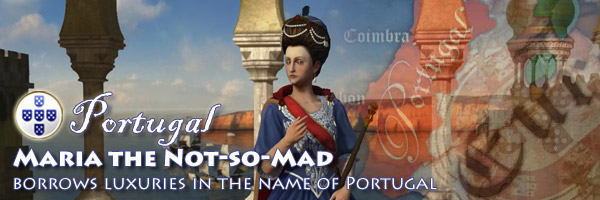
Going into the back-end of the new civilizations presented in Brave New World, here is another strategy posts. This time, I'll be discussing the gold-generating machine that is Portugal.
The Portuguese essentially initiated the European "Age of Discovery" through the efforts and patronage of Henry the Navigator. After exploring Atlantic islands, Africa, and South America, Portugal established the first world empire in Europe and became one of the wealthiest and most influential powers of the era. Portugal lost much of its imperial strength due to wars with Napoleon and after its most significant colony, Brazil, declared independence. Portugal would never regain its former glory, but it still maintained control over many trading colonies up through the nineteenth century through the use of Feitoria (fortified factory complexes) in its colonies, which are represented in Civ V as city states.
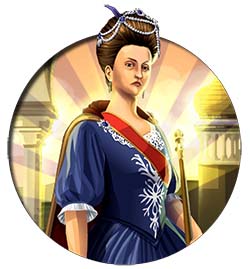
Maria I was the first undisputed queen regnant of Portugal and was crowned in 1777. Her rule was tarnished by mental instability and dementia that was first noticed in 1786 and which had made her incapable of managing affairs of state by 1792. The following decade, wars broke out with Spain and Napoleonic France, and Maria (along with the entire royal court) was moved to the colony of Brazil. Despite her madness, she is well-regarded among both Portuguese and Brazilian historians for her domestic policies and for supporting Brazilian independence. she is known as "Maria the Pious" in Portugal, and "Maria the Mad" in Brazil due to the fact that her mental state had already deteriorated by the time she had been relocated to Brazil, and her son had to perform most duties of state. [More]
655c6ad7-9fae-42c8-95b9-68b5c7d0e6d4|4|5.0
Tags:Sid Meier's Civilization, Civilization V: Brave New World, Civilization V, Portugal, Maria I, Nau, carrack, caravel, navy, Feitoria, factory, fort, closed sea, commerce, luxury resource, resource diversity, gold, trade, trade route, caravan, cargo ship, unique improvement, Exotic Cargo, Mare Clausum, city state, Civ-V
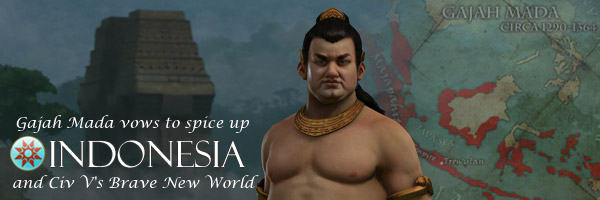
Continuing my series of Civilization V strategies, the third installation will cover Gajah Mada and his Indonesian "spice islands".
Indonesia is an Oceanic island nation between the Indian and Pacific oceans, north of Australia. Archaeological evidence shows that the region was inhabited by Homo Erectus, and that its primitive human occupants developed relatively advanced maritime technology, allowing them to sail across the ocean between the various islands of the Australian region as early as 42,000 years ago. Its early inhabitants took advantage of the tropical conditions to create flourishing agricultural communities and became masters of wet-field rice cultivation, as well as becoming traders and fishermen.
Much of the history of Indonesia has been shaped by maritime trade. Hinduism and Buddhism arrived in Indonesia around the seventh century through trade with India, and the Indonesian people welcomed these faiths with open arms and dedicated numerous temples (called "Candi") to the gods these religions brought with them. Islamic influences began around the thirteenth century in trade missions from the Middle East, and large portions of regional populations converted to this new religion. In the sixteenth century, Portuguese explorers brought Christianity to the islands. For the most part, the various religions in Indonesia intermixed and co-existed in relative peace and harmony. Portuguese traders quickly monopolized the trade of Indonesia's native nutmeg, cloves, and cubeb pepper. The Dutch arrived soon after and established their East India Company in the region and held tenuous control over the region until the Japanese occupation leading up to World War II. Following the war, bloody struggles for control of the nation resulted in hundreds of thousands of deaths, but democracy began to supersede authoritarian rule in the early 2000's. The Republic of Indonesia is currently the world's fourth most populous country, is the 16th largest economy in the world by GDP, and currently has dominion over 17,508 islands of the Indonesian archipelago.
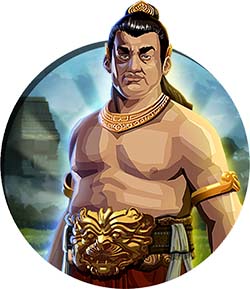
Gajah Mada (the "Elephant General") was a mahapatih (or "prime minister") of the Majapahit Empire during the early fourteenth century who, according to myth, made a vow not to eat any spices until he had conquered all of the southeastern Asian archipelago and united it under the empire. Little is known of his early life, but he lead the empire to the height of its power during this time and presided over the arrival of the first Muslim traders. His legacy has made him a symbol of Indonesian national pride to this day.
Success as the Indonesian Empire in Civilization V is partially determined by the player's ability to develop an intercontinental "island" empire, which grants access to the valuable nutmeg, clove, and pepper spices that dominated trade with Colonial European powers. Indonesia is also uniquely positioned in Civilization V to benefit greatly from possessing followers of multiple religions in its cities. [More]
de556f70-5074-40f5-9d73-25977fbbe320|4|4.5
Tags:Sid Meier's Civilization, Civilization V: Brave New World, Civilization V, Indonesia, Gajah Mada, Kris, Candi, Spice Islanders, nutmeg, pepper, cloves, luxury resource, invulnerability, sneak attack, heroism, ambition, restlessness, recruitment, enemy blade, evil spirits, religion, Hinduism, Buddhism, Islam, navy, embark, Polynesia, Kamehameha, island, swordsman, garden, Civ V Fall Patch, Civ-V
|

| 12 | | | | | | | 60 | | 11 | | | | | | | 55 | | 10 | | | | | | | 50 | | 09 | | | | | | | 45 | | 08 | | | | | | | 40 | | 07 | | | | | | | 35 | | 06 | | | | | | | 30 | | 05 | | | | | | | 25 | | 04 | | | | | | | 20 | | 03 | | | | | | | 15 | | 02 | | | | | | | 10 | | 01 | | | | | | | 05 |
|